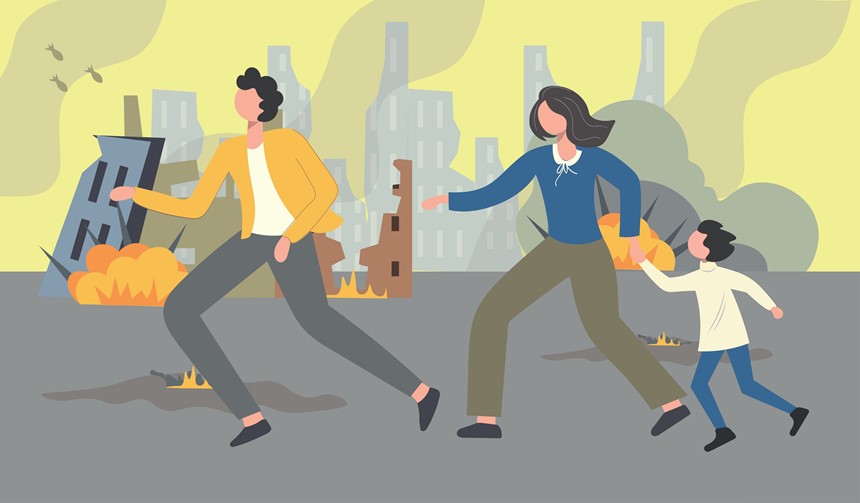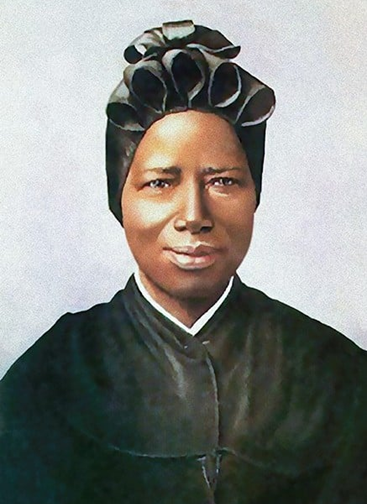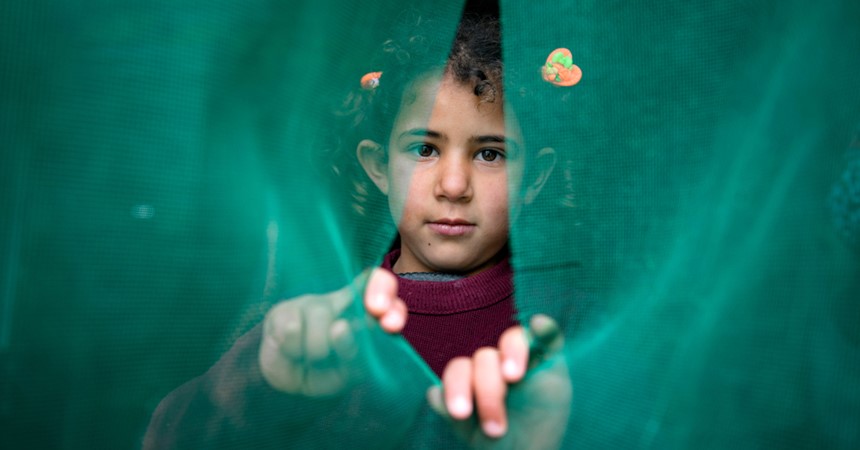The scripture story about the journey that Joseph and Mary made to Bethlehem and the birth of Jesus is proclaimed at Christmas. However, the escape to Egypt by Mary and Joseph is not often, if ever, an aspect of the Christmas story that we hear. It is an important one for us to reflect upon, especially at this time of year.
As we read in the Gospel of Matthew 2:13-15, after the visit from the Wise Men, we hear about the Holy Family’s fearful escape to Egypt. Herod wanted to kill the child Jesus, and, in Matthew 2:16-18, we see a violent massacre of infant boys. This story creates an unsettling image and feeling. it is intended to unsettle us today.
Bethlehem had become unsafe for this family, just as many places in the world today have also become unsafe for many families. As people leave these unsafe places, looking for refuge and security, it is up to the rest of the world, that includes us, to take notice and act in a way that acknowledges their dignity as human beings, and make decisions that bring light and life. The Holy Family found refuge, security, and peace in Egypt. How are we being called to make our global home a safe place for all?

Rather than safety, displaced people are more likely to find themselves victims of severe exploitation. They are vulnerable and don’t know how to or can’t advocate for themselves. As two millennia have passed, and refugee crises persist worldwide, it is crucial that we, the disciples of Jesus, see displaced people – those who migrate, flee, and seek refuge across borders – as made in the likeness and image of God. These crises are still an ongoing blight on humanity. According to the UNCHR Global Trends (correct as of June 2023) there were over 108 million people in this situation around the world, with an ever-increasing number daily. Out of those statistics nearly 50 million, a quarter of which are children, are victims of modern slavery. An additional 25 million are victims of trafficking.
The daily news is a barrage of hate, destruction, unforgiveness, retribution, misuse and abuse of power awash with the impact that those actions have on the powerless, the least of God’s people. There is much that we can do from our place of privilege. Christmas is a time to show our love for our family and friends and celebrate the ultimate gift and birth of our saviour, Jesus Christ. We invite people into our homes, beautifully set the table and share a meal. Many of us may have refugees in our own family history or know friends or neighbours that have come from various unsafe and dangerous situations.
The Catholic Church has a strong commitment to eradicating modern slavery, a stance grounded in Catholic Social Teaching. “At its heart the call to eradicate modern slavery and human trafficking is a call to make a choice for respecting the intrinsic and inalienable dignity of every human person” (Archbishop Fisher, 2018). We also acknowledge the impact that commercial activities, including our own, can have on vulnerable people through the practice of modern slavery. A missionary church has a responsibility to take practical action to manage these risks, create change and to ultimately eradicate modern slavery. We all share in that responsibility.
Unbeknownst to most of us, the liturgical calendar already provides us with an opportunity to engage our hearts and minds with the issue of modern slavery and human trafficking. On February 8 each year the church marks the feast of St Josephine Bakhita, the Patron Saint of Victims of Human Trafficking and Modern Slavery. The feast exists in the calendar as an optional memorial which every community can choose to celebrate at Mass and in an endless variety of other ways.

Patron Saint - St Josephine Bakhita - Catholic Archdiocese of Sydney (sydneycatholic.org)
The Feast of Josephine Bakhita provides our whole community - parishes, schools, homes and other groups – with a wonderful opportunity to reach out and connect with the wider Catholic community who have a strong commitment to social justice, specifically modern slavery and human trafficking. The feast provides an opportunity for relevant and meaningful formation and prayer. The International Day of Prayer and Awareness Against Human Trafficking also falls on 8 February. It too focuses on St Josephine Bakhita, highlighting the circumstances of violence and injustice affecting millions of voiceless people.
To that end the Diocesan Liturgy Council established a Working Party to study the issue of Modern Slavery and Human Trafficking and produce a range of resources for parishes, schools, homes and community groups.
It is hoped that the experience of prayer focused on current issues will help to form more deeply in the hearts and minds of the community, an appreciation of the integral link between prayer and Christian life and action. The following resources are a first step as we look forward to the journey ahead. These are critical issues for a church that exists for mission. They also provide an opportunity to learn more about St Josephine and her story.
About Josephine, Pope Francis says:
‘(The Church) is charged with showing to all the path to conversion, which enables us to change the way we see our neighbours, to recognise in every other person a brother or sister in our human family, and to acknowledge his or her intrinsic dignity in truth and freedom. This can be clearly seen from the story of Josephine Bakhita, the saint originally from the Darfur region in Sudan who was kidnapped by slave-traffickers and sold to brutal masters when she was nine years old. Subsequently – as a result of painful experiences – she became a “free daughter of God” thanks to her faith, lived in religious consecration and in service to others, especially the most lowly and helpless. This saint, who lived at the turn of the twentieth century, is even today an exemplary witness of hope for the many victims of slavery; she can support the efforts of all those committed to fighting against this “open wound on the body of contemporary society, a scourge upon the body of Christ” (10 April 2014)
We ae a missionary Church and Bishop Michael is calling us all to take up our call to mission and evangelisation with renewed energy and commitment. While the Feast of Josephine Bakhita provides us with a focus for this, it is important to remember that Modern Slavery and Human Trafficking isn’t seasonal. As we journey through this Christmas season of giving, let’s start making purchases that make a difference in more than one person’s life. You might like to consider giving a gift that gives twice.
You can start by choosing to shop ethically and charitably. The following 10 websites offer a different way of shopping or making a donation that will make a difference.
- That Catholic Shop - The proceeds of every purchase at That Catholic Shophelp Christians who are suffering, oppressed or persecuted. That Catholic Shop - Home
- For Dignity - Provide hope, dignity and freedom to women affected by exploitation. Ethical & Sustainable Gifts in Australia | Women Gifts Online – For Dignity
- Catholic Mission - By purchasing a Life-Giving Gift this Christmas, you are making a lasting impact for children, families and communities in most need. All (catholicmission.org.au)
- St Columban’s Missionary Society - Provides comfort to the lonely, hope to the despairing, and assistance to those facing challenging circumstances. Shop Catholic Products & Gifts Online | St Columbans
- UNHCR The UN Refugee for Australia - Advocate and fundraise for refugee protection, emergency aid, and long-term support and solutions, helping the UN Refugee Agency (UNHCR) reach millions of vulnerable people each year. Refugee Charity Christmas Gifts | Australia for UNHCR - UNHCR (unrefugees.org.au)
- Caritas Australia Mission - The Catholic Church's international aid and development agency in Australia. They are committed to working alongside the most vulnerable and addressing the imbalance of power by including the people affected in the decisions impacting their lives. Creating a Resilient Future | Caritas Australia
- The Fair Trader - They are proud members of the Fair Trade Association of Australia and New Zealand. They stock products made by organisations with transparent and deeply held ethical values with goals of poverty alleviation and empowerment. Ethical and Fair Trade Gifts Australia – The Fair Trader (thefairtraderstore.com.au)
- Uplift Fair Trade - Uplifting disadvantaged artisans through trade, creating dignity and hope. Focusing on giving sustainable livelihoods to people with a disability, women’s empowerment groups, women living in slums, people who have come out of trafficking. Fair Trade Ethical Christmas Gifts and Products | Uplift Fair Trade
- The Leprosy Mission Shop Australia - strives to eliminate the stigma and discrimination that is associated with leprosy. Shop - The Leprosy Mission Australia – The Leprosy Mission Shop
- Refugee Hub: CatholicCare Social Services, Diocese of Maitland – Newcastle - Support people from refugee, asylum-seeker, and vulnerable migrant backgrounds to settle into life in Australia. They welcome people from all social, ethnic and religious backgrounds. Refugee Hub - CatholicCare Social Services Hunter-Manning
So, over to you. Those who are involved in parishes and schools might consider asking the community to respond through prayer and action, particularly on 8 February 2024.
There are many Holy families – Jews, Muslims, Christians, Palestinians, Ukrainians, Russians, Africans, Afghanis, Syrians, Myanmarese, sadly the list goes on. The arrival of Jesus as a vulnerable baby reminds us that this is a moment of solidarity with all people, especially those that find themselves in unsafe positions in our world.
Let me leave you with the words of St Josephine:
“The best thing for us is not what we consider best, but what the Lord wants of us…we must love everyone…we must be compassionate!”
Follow mnnews.today on Facebook.

